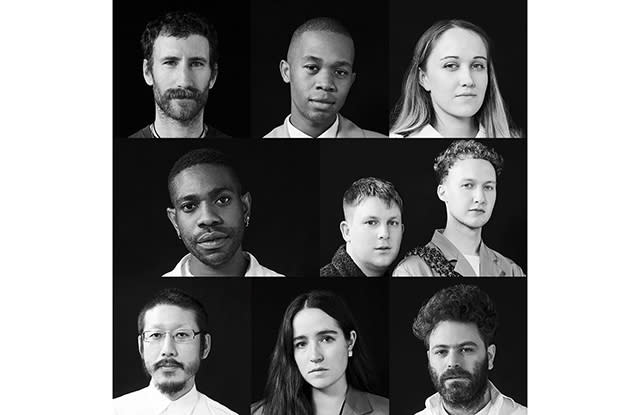LVMH Prize Finalists Include Two African Designers

- Oops!Something went wrong.Please try again later.
LVMH Moët Hennessy Louis Vuitton has unveiled the names of the eight finalists for the LVMH Prize for Young Designers, and for the first time, designers from Nigeria, South Africa and Israel have made the final round of the competition.
“We are very proud of the international dimension of the prize. It’s really what sets it apart,” said Delphine Arnault, the force behind the initiative. “The LVMH Prize is global. It reflects the fact that fashion is now a global market, with a capacity to reach and to touch more and more people, namely thanks to the internet.”
More from Footwear News
Among those competing for a grand prize of 300,000 euros ($338,000), plus a year of coaching from experts at family-controlled LVMH — the parent of brands including Louis Vuitton, Dior and Fendi — are four labels making gender-neutral clothes, two womenswear designers and two menswear designers.
“Gender issues and the question of women’s place in society are key concerns for young people today, I believe. It’s normal therefore for designers to seize on those topics, which inform their designs,” said Arnault, who is a key talent scout at the French luxury conglomerate.
The finalists, selected by a committee of 63 fashion industry experts, are Anrealage, designed by Kunihiko Morinaga; Bethany Williams; Bode by Emily Adams Bode; Hed Mayner; Kenneth Ize; Phipps by Spencer Phipps; Stefan Cooke by Stefan Cooke and Jake Burt; and Thebe Magugu.
They will gather in June at Fondation Louis Vuitton in Paris to face a jury stacked with LVMH fashion stars, including for the first time Berluti’s Kris Van Assche. He will join existing members including Maria Grazia Chiuri at Dior, Marc Jacobs and Louis Vuitton’s Nicolas Ghesquière.

LVMH
“I’m delighted to welcome Kris into the jury. He paid us a visit during the semifinalists’ showroom and spent a lot of time with each designer. I’m sure they were honored to be able to exchange views with such a talented designer,” Arnault said.
The prize, now in its sixth edition, will take place for the first time in the absence of Karl Lagerfeld, the doyen of the luxury giant’s jury members, who passed away last month at the age of 85.
Arnault noted that while many of the finalists shared a concern for social and environmental issues, originality is key. “We will be looking for the singularity of a creative expression, the potential, the surprise — all qualities shared by the selected designers,” she explained.
Magugu, a South African womenswear designer, recently won the overall award for curation and fashion content at the International Fashion Showcase in London. Speaking at the cocktail held for the 20 semifinalists of the prize during Paris Fashion Week, he noted that South Africa was enjoying a creative resurgence.
“I love the fact that I get to showcase what’s actually happening in the country through my clothing,” Magugu said. “I feel like it’s been largely overlooked as a country that adds anything to fashion, but I think there’s something quite exciting and bubbling happening right now. Hopefully I won’t be the first and the last.”
Ize, a Nigerian designer whose handwoven suits appeal to men and women alike, studied at the University of Applied Arts under Hussein Chalayan and Bernhard Willhelm, but said that being selected for the prize felt like a breakthrough. “This is my dream. I went to school because I never saw any African designers,” he said.
Israeli designer Hed Mayner, meanwhile, has won plaudits for his gender-fluid designs that play on proportions and layering. His minimalist men’s clothes are sold online via Farfetch and Ssense.
The socially conscious designers on the list include London-based Bethany Williams, who received the Queen Elizabeth II award during London Fashion Week.
For her fall 2019 menswear collection, Williams partnered with the women’s shelter Adelaide House to create illustrations of the women who live in the shelter on her roomy tailoring pieces and donating 20 percent of profits to the charity.
“Everything is either organic or recycled, and I also work with different social projects on the manufacturing. I use Downview Prison on the jersey manufacturing, and a drug rehabilitation center to develop handwoven fabrics from waste,” she said at the LVMH cocktail.
“My sell-through has been really strong, so it’s a promising sign that customers are responding,” Williams added.
Bode started out producing one-of-a-kind clothing from antique fabrics, including Victorian quilts, old grain sacks and French bed linens from the ’20s. But she has adapted her production methods as she grows her New York-based men’s brand, which is carried by 45 retailers worldwide.
“It began as one of a kind, and now what we bring to market is not necessarily one of a kind. Some of our stores prefer it, and then some of our stores would rather have the reproduced textiles that we do: intricate hand embroideries in India, patchworking in our New York studio,” she explained.
Arnault noted that while LVMH was happy to see designers incorporate sustainability into their design process, that was not a key criterion. “We are sensitive above all to the creativity of the candidates,” she said.
This story was reported by WWD and originally appeared on WWD.com.
Watch the video below on how to succeed in the shoe industry.
Best of Footwear News
What Is Gisele Bündchen's Net Worth? Here's How Much Money She Makes & How She Spends It
COVID-19 Cancellations Are Back for Sports, Broadway, & Other Major Events
Sign up for FN's Newsletter. For the latest news, follow us on Facebook, Twitter, and Instagram.

